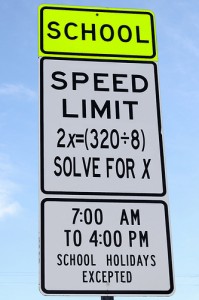Should Algebra Remain Part Of The Graduation Equation?
Is there a growing push to trim advanced math requirements for students who won’t use the lessons in “the real world?”
City University of New York political science professor Andrew Hacker authored a Sunday op-ed in the New York Times which questions whether U.S. schools should require students to pass algebra in order to graduate.
Algebra is the foundation for most higher math, including trigonometry and calculus. And the application of advanced math helps explain physics, geometry, biology and how the world works in general.
But Hacker argues not every student is cut out for advanced math, and most will not use it once out of school. He notes that in some states more than one in three students failed required algebra exams (42 percent of those taking Florida’s algebra exam for the first time in Spring 2012 failed it).
Hacker cites research and experts to argue that difficulty with algebra prompts many students who would excel in other subjects to drop out. From the piece:
This debate matters. Making mathematics mandatory prevents us from discovering and developing young talent. In the interest of maintaining rigor, we’re actually depleting our pool of brainpower. I say this as a writer and social scientist whose work relies heavily on the use of numbers. My aim is not to spare students from a difficult subject, but to call attention to the real problems we are causing by misdirecting precious resources.
The toll mathematics takes begins early. To our nation’s shame, one in four ninth graders fail to finish high school. In South Carolina, 34 percent fell away in 2008-9, according to national data released last year; for Nevada, it was 45 percent. Most of the educators I’ve talked with cite algebra as the major academic reason.
Shirley Bagwell, a longtime Tennessee teacher, warns that “to expect all students to master algebra will cause more students to drop out.” For those who stay in school, there are often “exit exams,” almost all of which contain an algebra component. In Oklahoma, 33 percent failed to pass last year, as did 35 percent in West Virginia.
Hacker’s argument is a variation on the debate about vocational education: Why should one curriculum be expected to fit all students? Why not let students find the path which works best for his or her talents?
Hacker has found much support for his suggestion. But others argue that algebra is a fundamental skill.
The math may not be necessary for all, but the problem-solving skills algebra teaches through the use of variables and manipulating equations are essential.
Other educators note the problem isn’t with the material, but how algebra is often taught.
Florida requires algebra in order to graduate high school, and algebra is included in Common Core standards which will take effect in 2014.
The goal of those standards is to prepare students who are ready for college or to enter a more technologically advanced workforce.
What’s been your experience with teaching/learning algebra? How much math is essential?

